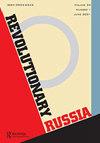Modernization on Empty Coffers: Polish Minority Institutions in Early Soviet Ukraine
IF 0.2
2区 历史学
Q2 HISTORY
引用次数: 0
Abstract
After the Civil War, the Bolshevik government planned to mobilize the Soviet population on a voluntary basis and installed opportunities for local self-administration. Rural soviets were the most promising initiative. National minorities received particular attention. Western Soviet Ukraine with its Polish communities provides case studies for the practical impact of these ‘affirmative action’ policies. This article explores three configurations of Polish minority institutions: (a) neighbouring rural soviets close to an urban centre, (b) neighbouring rural soviets far from any urban centre and (c) isolated rural soviets far from any larger urban centre. Whereas small and poor Polish rural soviets could not function properly, bigger and financially better-equipped ones could improve their communal life by well-equipped community centres and minority schools. Yet despite the affirmative action propaganda, the state and party institutions drained the local self-administration of their financial surplus. With a few exceptions, they did not plan to invest sparse state funds into the development of a particular Soviet Polish culture. This lack of financial commitment combined with the Polish communities’ resilience against atheist initiatives from above led the communist organizations within the rural soviets such as KNW, Komsomol, and the Pioneers to complete failure. The subsequent disappointment within the party paved the way for ideas of forced collectivization.空金库的现代化:苏联早期乌克兰的波兰少数民族机构
内战结束后,布尔什维克政府计划在自愿的基础上动员苏联人口,并为地方自治创造机会。农村苏维埃是最有希望的创举。少数民族受到特别注意。西苏联乌克兰及其波兰社区为这些“平权行动”政策的实际影响提供了案例研究。本文探讨了波兰少数民族机构的三种结构:(a)靠近城市中心的邻近农村苏维埃,(b)远离任何城市中心的邻近农村苏维埃,以及(c)远离任何较大城市中心的孤立农村苏维埃。波兰农村的小而贫穷的苏维埃无法正常运作,而规模更大、财力更雄厚的苏维埃可以通过设备齐全的社区中心和少数民族学校来改善他们的公共生活。然而,尽管有平权行动的宣传,国家和党的机构还是榨干了地方自治政府的财政盈余。除了少数例外,他们不打算将稀少的国家资金投入到发展特定的苏联波兰文化中。财政承诺的缺乏,加上波兰社区对来自上层的无神论倡议的抵抗力,导致农村苏维埃中的共产主义组织,如know、共青团和先锋队彻底失败。随后党内的失望为强制集体化的思想铺平了道路。
本文章由计算机程序翻译,如有差异,请以英文原文为准。
求助全文
约1分钟内获得全文
求助全文

 求助内容:
求助内容: 应助结果提醒方式:
应助结果提醒方式:


